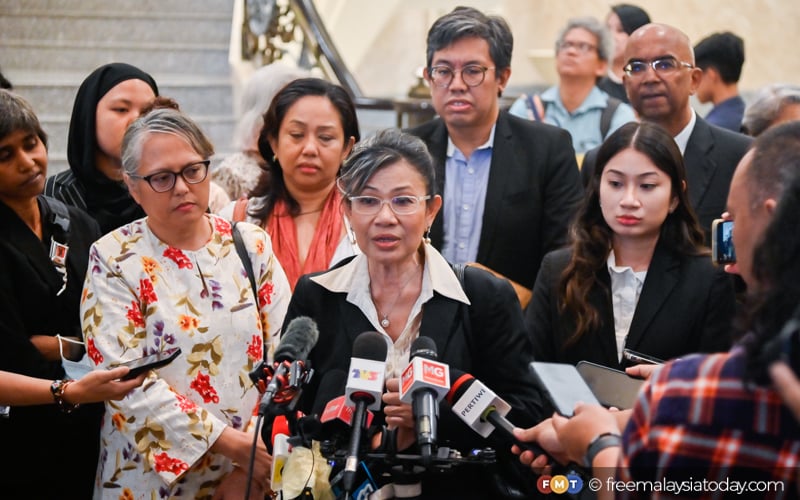
From Surendra Ananth
Yesterday, retired Court of Appeal judge Hamid Sultan Abu Backer said the proceedings initiated by Nik Elin Zurina Nik Abdul Rashid and her daughter, Tengku Yasmin Nastasha Tengku Abdul Rahman, to challenge certain provisions in the Kelantan Syariah Criminal Code (I) Enactment 2019 were irregular and could be set aside.
He said the failure to name the federal government as a party to the case was fatal “as the position of the federal government must be part of the record in the case”.
He also made remarks against the judge who granted leave for the action to proceed to the Federal Court and the seven other judges forming the majority in the apex court for not writing their separate judgments.
The judiciary cannot use the mass media to defend itself. So, it is up to the attorney-general (AG) or members of the legal profession to defend the judiciary.
With respect, Hamid’s views cannot stand, especially since critical information has been left out.
First, Article 4 of the Federal Constitution allows any party to mount a challenge on the grounds that Parliament (for federal laws) or the state legislature (for state laws) had no powers to enact such legislation.
The challenging party must first get permission from a single judge of the Federal Court. This is a filter process to ensure the challenge is not frivolous.
The law only requires the challenging party to name the relevant government. For a challenge on a state law, it would be the relevant state government. In this case, Nik Elin and her daughter named the Kelantan government.
Second, the federal government is entitled to be a party to any proceeding where a state law is challenged. For a challenge to a federal law, it must be named as a party, but this is up to the federal government.
Third, the federal government was fully aware of Nik Elin’s case. The granting of leave on Sep 30, 2022 and the two hearings before the Federal Court in 2023 were widely publicised.
In fact, Prime Minister Anwar Ibrahim discussed this specific case in Parliament on Nov 11, 2023.
In his written response to questions posed on the federal government’s stand, he made known the AG’s view that the laws under challenge were invalid as there are existing federal laws on the subject.
This view was based on a previous Federal Court decision. Anwar concluded that it would be best if the federal government did not intervene in the case as it would be forced to take an inconsistent stand with that of the Kelantan government, thus affecting the relationship between the two governments.
So, the federal government made a decision not to intervene in this case.
Fourth, the written response above and the parliamentary Hansard were put on record before the Federal Court by way of an affidavit affirmed by Nik Elin. Thus, the federal government’s position was put before the court.
Fifth, while Hamid is correct to say that proceedings can be set aside for a breach of natural justice, no such breach happened here.
All the necessary parties were heard. The federal government did not want to intervene and its position was put on record.
In any event, no federal laws were affected or even made the subject of challenge. No party took the position that any federal law was invalid.
Sixth, Hamid’s rigid view on legal standing is, with respect, surprising. As Hamid rightly pointed out, this is a case of public interest as it involves the validity of laws.
He was the dissenting judge in Indira Gandhi’s case at the Court of Appeal. His stand was eventually vindicated by the Federal Court when Indira’s appeal was allowed.
In his dissenting view, Hamid criticised the strict view on legal standing previously stated by the majority of the Federal Court in the famous Lim Kit Siang case, where Lim challenged the government’s decision on the North-South Expressway.
Hamid said in his dissenting judgment: “Arguably, Lim’s case exposes judicial disaster in the administration of justice when, by the court’s decision, the court’s door to seek issues related to accountability, transparency and good governance – the soul of rule of law – was more or less closed by advocating ‘locus standi’ of the litigant to question the policy of the government.
“Professor Andrew Harding was subtle in his observation on the damage done by Lim’s decision in the public law field in contrast to the former Federal Court judge, Gopal Sri Ram.
“To put it bluntly, both the jurists in my view are saying the ‘soul’ of rule of law is necessary to check excesses by public decision-makers to ensure economic success as well as fundamental rights in any democratic nation.”
If any concerned citizen can challenge a governmental decision that has serious public repercussions, why can’t the same be said for an unconstitutional law?
Both organs – the executive and Parliament – are subject to the Federal Constitution.
While it is perfectly fine to criticise judgments of the court, it is imperative to ensure all relevant information is disclosed so that the public is not misinformed.
This is more so when the views are expressed by members of the legal profession. - FMT
Surendra Ananth was the solicitor for Nik Elin Zurina Nik Abdul Rashid and her daughter in their constitutional challenge and is an FMT reader.
The views expressed are those of the writer and do not necessarily reflect those of MMKtT.


No comments:
Post a Comment
Note: Only a member of this blog may post a comment.